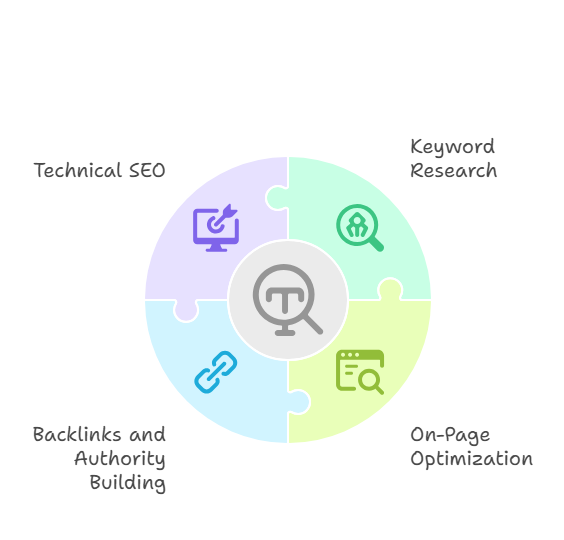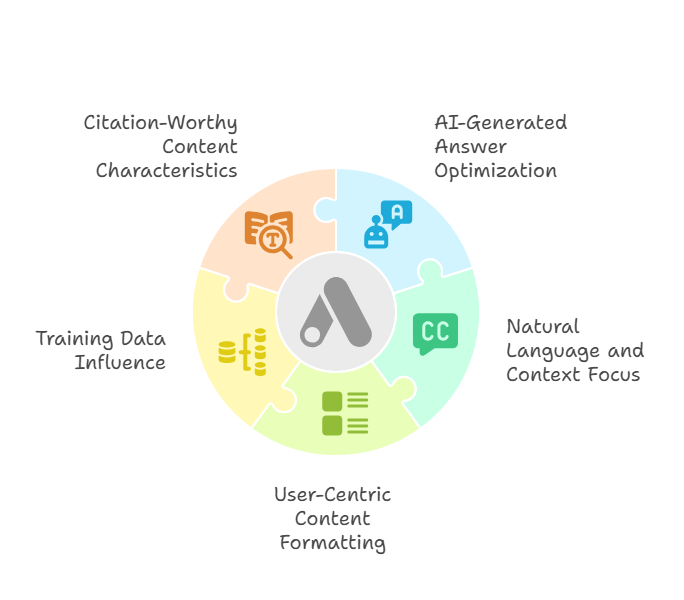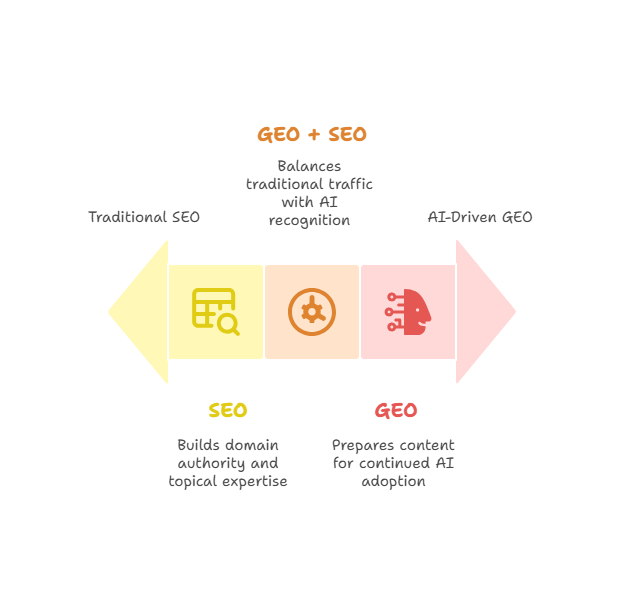The search landscape has transformed dramatically in 2025. Traditional Google searches now compete with AI-powered tools like ChatGPT, Google’s Bard, and Bing’s AI chat for user attention. This shift demands a new understanding of content optimization.
Two critical strategies have emerged: SEO (Search Engine Optimization) and GEO (Generative Engine Optimization). SEO targets traditional search engine rankings, while GEO optimizes content for AI-generated responses and citations.
Modern businesses must master both approaches. Your audience splits their attention between traditional Google searches and AI chat tools. Optimizing for only one strategy means missing significant opportunities for visibility and traffic.
This comprehensive guide explains both strategies, provides real-world examples, and delivers actionable implementation steps for your content marketing success.
What is SEO?
Search Engine Optimization remains the foundation of digital marketing after two decades of evolution. SEO involves optimizing websites and content to achieve higher rankings in search engine results pages (SERPs).

How Traditional SEO Works
Traditional SEO operates through four fundamental pillars:
Keyword Research: Identify search terms your target audience uses when seeking information, products, or services. Tools like Ahrefs Keywords Explorer reveal search volume, competition levels, and related terms.
On-Page Optimization: Strategically place target keywords in page titles, headers (H1, H2, H3 tags), meta descriptions, and content body. This signals search engines about your page’s topic and relevance.
Backlinks and Authority Building: Earn links from reputable websites in your industry. Search engines interpret backlinks as endorsements, increasing your content’s authority and ranking potential.
Technical SEO: Optimize website loading speed, mobile responsiveness, site structure, and XML sitemaps. These factors ensure search engines can efficiently crawl, index, and understand your content.
Where Traditional SEO Still Wins
Despite AI advancement, traditional SEO maintains significant advantages:
Google SERP Rankings: Google processes over 8.5 billion daily searches. Top-ranking pages capture the majority of organic traffic, with the first position receiving approximately 28.5% of clicks.
Long-Term Organic Traffic: Well-optimized content generates consistent traffic for years. Evergreen content pieces continue attracting visitors and generating leads long after publication.
What is GEO?
Generative Engine Optimization represents the next evolution in content optimization. GEO focuses on making your content discoverable and citable by AI-powered tools like ChatGPT, Google Bard, and Bing AI.

Breaking Down Generative Engine Optimization
GEO optimizes content for AI-generated responses rather than traditional search rankings. Success means becoming a trusted source that AI tools reference when answering user questions.
AI-Generated Answer Optimization: Structure content for easy extraction and reformatting by AI models. Focus on clear, complete answers rather than keyword-optimized paragraphs.
Natural Language and Context Focus: AI models understand conversational patterns better than keyword strings. Write naturally while providing comprehensive, contextual information.
User-Centric Content Formatting: Organize information to match natural question patterns. Use FAQ sections, step-by-step guides, and descriptive headings that mirror spoken queries.
How Generative Engines Deliver Answers
Understanding AI behavior helps optimize content more effectively:
Training Data Influence: AI models like GPT-4 learn from massive datasets including web content, books, and articles. Content matching these high-quality patterns has better citation potential.
Citation-Worthy Content Characteristics: AI tools reference sources that provide unique insights, comprehensive coverage, and authoritative information. Building topical expertise increases citation frequency.
GEO vs SEO: Key Differences
| Category | SEO | GEO |
|---|---|---|
| Optimization Target | Google Search Results Pages | AI Chatbots and Language Models |
| Strategy Focus | Keywords and Backlinks | Context and Natural Language |
| Success Measurement | Rankings, Traffic, Click-Through Rates | Citation Presence, AI Mentions |
| Content Format | Keyword-Optimized Web Pages | Conversational, FAQ-Driven Answers |
The fundamental difference: SEO aims for discovery, while GEO targets citation. SEO success means users click through to your website. GEO success means AI tools reference your expertise, building brand authority even without direct clicks.
Why GEO Is Growing in Importance
AI-powered search adoption accelerates rapidly, creating new opportunities for content visibility:
AI Search Integration: Microsoft Bing includes AI chat functionality, Google launched Search Generative Experience (SGE), and ChatGPT added real-time browsing capabilities. These features serve millions of users daily.
Changing User Behavior: Users increasingly prefer comprehensive answers over multiple website visits. Instead of clicking through several blog posts, they ask AI tools for complete solutions.
Brand Authority Benefits: AI tool mentions establish credibility and thought leadership. When ChatGPT references your company as an industry leader, that endorsement carries significant weight with potential customers.
Real-World Examples of GEO in Action
These case studies demonstrate successful GEO implementation:
Example 1: Recipe Website Optimization
A popular cooking website optimized for Google’s Search Generative Experience by restructuring content to include:
- Conversational recipe introductions explaining cooking science
- Comprehensive ingredient substitution guides in Q&A format
- Detailed technique explanations with troubleshooting tips
- FAQ sections addressing common cooking problems
Results: 40% increase in brand mentions across AI-generated cooking advice, plus significant brand recognition growth.
Example 2: Financial Education Platform
A financial website focused on beginner-friendly explanations by creating:
- Complete answers to complex financial questions
- Practical examples with real calculations
- Simple-language glossaries and definitions
- Contextual explanations covering both concepts and applications
Results: Regular citations in ChatGPT financial advice responses, leading to increased newsletter subscriptions and course enrollments.
Step-by-Step: How to Optimize Your Content for GEO

Follow this practical roadmap for effective GEO implementation:
- Write in Natural Language: Replace keyword-focused phrases with conversational questions. Transform “SEO strategies small business 2025” into “What are the most effective SEO strategies for small businesses in 2025?”
- Provide Complete Answers: Address user questions thoroughly with actionable advice, implementation steps, and expected results. Ensure answers can stand alone as valuable responses.
- Include Semantic Keywords: Use related terms and synonyms naturally throughout content. For “email marketing” content, include “email campaigns,” “newsletter strategy,” and “email automation.”
- Add Structured Elements: Create FAQ sections, article summaries, and key takeaway lists. These elements help AI tools extract and present information effectively.
- Optimize Content Structure: Use descriptive headings, bullet points, numbered lists, and short paragraphs. Well-organized content improves AI parsing and extraction.
- Match AI Summarization Patterns: Lead with important information, provide context, and include specific examples. Study how AI tools present information and format content accordingly.
Pro Tip: Test your content by asking AI tools questions about your topic. Analyze their responses, then create content that provides superior, more comprehensive answers.
Top GEO Optimization Tools and Usage Guide
These tools help implement effective GEO strategies:
Surfer SEO: Analyze topic coverage and identify semantic keywords that AI models value. Use content analysis features to ensure comprehensive topic coverage beyond basic keyword targeting.
AlsoAsked and AnswerThePublic: Discover actual user questions about your topics. Structure content around real queries to match natural search patterns.
ChatGPT and Claude: Test content effectiveness by asking relevant questions and analyzing AI responses. Create content that surpasses current AI-generated answers.
Bing Chat and ChatGPT Plugins: Monitor which sources get cited for topics in your expertise area. Analyze citation-worthy content characteristics and apply insights to your strategy.
Action Item: Ask ChatGPT or Bing Chat three questions related to your business expertise. Note cited sources and analyze what makes them reference-worthy.
How Google Is Integrating Generative AI Into Search
Google’s AI integration represents the most significant search evolution since featured snippets launched.
Google SGE Overview: Search Generative Experience creates AI-powered overviews at the top of search results. SGE synthesizes information from multiple sources while maintaining traditional search results below.
Content Discovery Changes: SGE can answer questions without requiring website clicks, but it typically cites sources and provides links for deeper exploration. Quality content becomes more important as Google’s AI needs reliable sources for accurate responses.
Citation-Worthy Content Requirements: SGE favors content that provides unique insights, comprehensive coverage, comes from authoritative websites, includes current information, and uses clear structural organization.
GEO Plus SEO: Why You Need Both Strategies
GEO and SEO work together as complementary optimization approaches:
Future-Proofing Benefits: GEO prepares your content for continued AI adoption while SEO maintains current traffic sources. Early AI optimization creates competitive advantages similar to early voice search preparation.
SEO Foundation Value: Traditional SEO builds domain authority and topical expertise that supports GEO goals. Search engine recognition helps establish the credibility that AI tools consider when selecting sources.
Hybrid Strategy Success: Businesses implementing both approaches report 60-80% increases in overall search visibility by capturing traditional search traffic while building AI tool recognition.
Expert Tips and Best Practices
“The future belongs to content creators who understand they’re writing for humans using both traditional search engines and AI tools. The best optimization strategy creates genuinely helpful, comprehensive content that serves real user needs regardless of the discovery method.” – Sarah Chen, AI and Search Strategy Consultant
Five Immediate GEO Actions:
- Audit Top Content: Rewrite introductions for your five most popular posts to directly answer main user questions with complete, standalone answers.
- Create Question-Based Content: Publish content that starts with specific audience questions and provides comprehensive, actionable answers.
- Add Contextual Depth: Explain not just what to do, but why strategies work, when to use them, and what results to expect.
- Test with AI Tools: Regularly query AI tools about your industry topics and identify opportunities to provide superior answers.
- Strengthen Author Authority: Update author bios to clearly establish expertise and credentials, as AI models consider source authority when selecting references.
FAQs: GEO vs SEO
Can you do GEO without SEO?
While technically possible, combining both strategies proves more effective. SEO provides the authority foundation that AI models consider when evaluating trustworthy sources. Traditional search also continues driving majority web traffic for most businesses.
Is GEO replacing SEO?
No, GEO complements rather than replaces SEO. Traditional search behavior expands to include AI tools rather than disappearing. Successful modern strategies master both channels.
How do I get featured in ChatGPT answers?
Create comprehensive, authoritative content that thoroughly answers specific questions using natural language. Provide context, examples, and establish expertise in your field. While you cannot directly control AI references, you can increase chances by becoming a recognized authority with superior content.
How do I measure GEO success?
Track brand mentions in AI responses, monitor referral traffic from AI tools with browsing capabilities, measure branded search query increases, and note improvements in industry recognition and thought leadership.
Conclusion: The Future of Search Belongs to Hybrid Strategies
The search landscape transformation represents one of the biggest shifts since Google’s early days. AI-powered search tools create fundamental changes in how people find and consume information.
Key Takeaways:
- Both SEO and GEO are essential for comprehensive search visibility
- User behavior evolves toward comprehensive answers rather than multiple website visits
- Quality content creation succeeds in both traditional and AI-powered search environments
- Authority building benefits both SEO rankings and AI tool recognition
Successful businesses start adapting now rather than waiting for perfect clarity on AI search evolution. They experiment, learn, and build hybrid strategies that work across all search platforms.
Begin by optimizing one piece of existing content using GEO principles this week. Test it with AI tools, analyze responses, and iterate based on results. The future of search is already here, and your content strategy should be ready to succeed regardless of how the landscape continues evolving.


